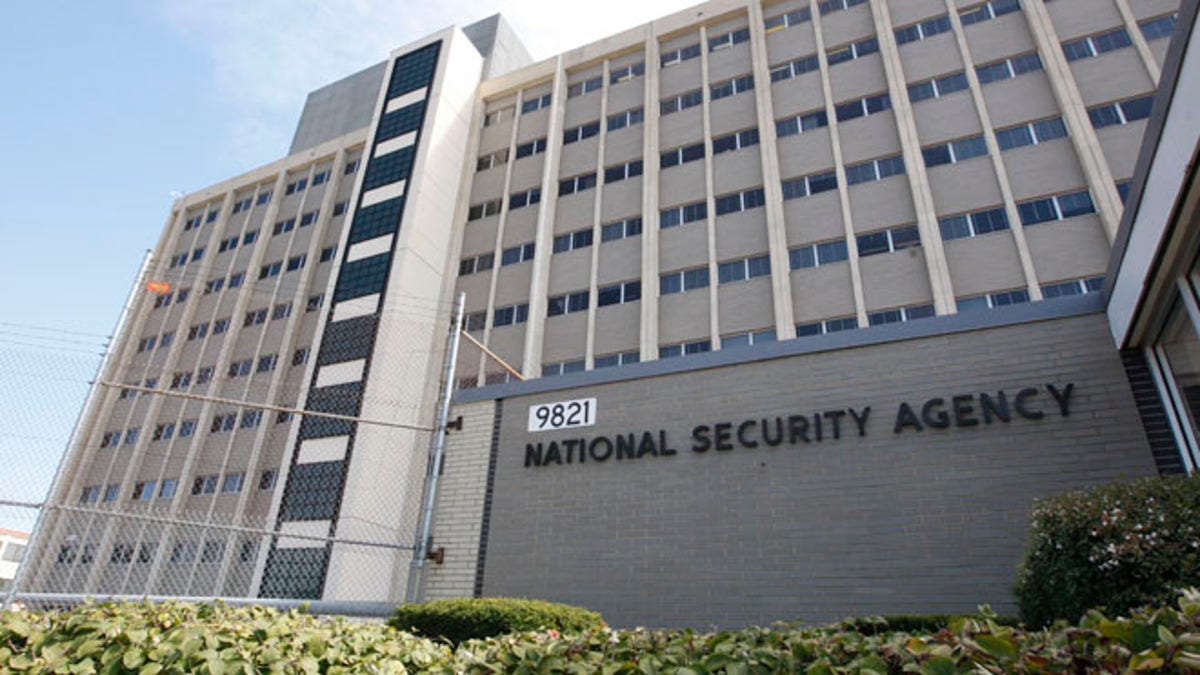
Sept. 19, 2007 file photo shows the National Security Agency building at Fort Meade, Md. ((AP))
While the White House battles Congress over everything from the budget to ObamaCare, a potentially seismic shake-up is happening in America's relationship with some of its most-longstanding allies.
For weeks now, a damaging trickle of once-secret information about the National Security Agency's spying abroad has outraged U.S. partners. France is the latest to formally protest over its citizens' alleged treatment at the hands of NSA analysts.
But new reports are also emerging about a decision by Saudi Arabian officials to distance themselves from Washington. The Wall Street Journal reported overnight that Saudi Arabia's intelligence chief told European diplomats that the country will pull back on its cooperation with the U.S. on arming and training Syrian rebels.
The statement comes after Saudi Arabia, in a surprise move, on Friday renounced its seat on the U.N. Security Council. The delegation cited dismay with the Security Council's lack of action toward Syria, but Prince Bandar Bin Sultan al-Saud allegedly told western diplomats that "this was a message for the U.S."
Prince Bandar is a longtime ally of successive U.S. administrations. He was said to have earned the nickname "Bandar Bush" due to his close relationship with George W. Bush.
Despite Saudi Arabia's widely condemned human rights record, the country is still considered a vital ally in a volatile region, and a counterweight to Iran -- Saudi Arabia's historical enemy.
The Saudi pull-back reportedly is tied to disappointment over the U.S. decision not to proceed with a strike on the Assad regime in Syria, as well as a possible softening of the relationship between Washington and Tehran.
Fox News Middle East analyst Walid Phares said Tuesday that Saudi Arabia is not alone.
"Jordan is in the same view. Kuwait, Bahrain, the U.A.E.," he told Fox News. "What we see forming is a bloc of former Arab allies or of Arab allies who are not very happy."
Secretary of State John Kerry met with the Saudi foreign minister on Monday in Paris, and according to the Journal urged the country to reconsider its U.N. decision. It is unclear whether Prince Bandar's comments reflect the view of the rest of the monarchy.
Meanwhile, the Obama administration is trying to quell the outrage among European partners over its NSA practices.
The French publication Le Monde published a bombshell report on Monday detailing how the NSA gathered more than 70 million French phone records over a month period. Some conversations reportedly were recorded.
The French government summoned the U.S. ambassador for an explanation, as Kerry was visiting Paris. President Obama also called French President Francois Hollande to discuss the leaks about NSA activities.
A statement from the White House said some of those reports "have distorted our activities" while some have raised "legitimate questions for our friends and allies about how these capabilities are employed."
The Cato Institute's Christopher Preble told FoxNews.com that the U.S. risks losing cooperation from these countries if the government does not address these concerns.
"I think there's going to be enormous pressure on the United States to come clean," he said, describing the reported activities in France as "wholesale violations of privacy."
Preble, though, cast a skeptical eye toward Saudi Arabia's reported concerns. He noted that their decision not to take a seat on the Security Council could have just as easily been a protest against China and Russia, which for a long time actively blocked intervention in Syria.
As for Saudi Arabia's alliance with the U.S., he said: "What's their alternative?"
James Carafano, foreign policy analyst with The Heritage Foundation, said that while the tensions overseas may not represent a drastic shift, "real cracks" are showing.
"This notion of 'don't worry, they'll always be with us,' that may not necessarily always be true," he said.
On the NSA front, State Department spokeswoman Marie Harf noted Monday that the Obama administration is formally reviewing its intelligence-gathering activities, while also reassuring other countries "that we take their concerns seriously."
She stressed that the intelligence is collected to protect allies' citizens as well.
"People understand the value of intelligence gathering around the world, right? It's where the balance lies between privacy and security, and those are the conversations we're having right now," she said.
France is one of America's oldest allies, and U.S. officials are keen to ease the tension over U.S. spying. Flare-ups with other countries have been quick and harsh.
Brazilian President Dilma Rousseff nixed a state visit to Washington following reports that the U.S. was tapping into Brazilian communications and networks.
Germany and Mexico have also voiced serious concern about U.S. surveillance. A new report in the German magazine Der Spiegel said a division of the NSA once gained access to former Mexican President Felipe Calderon's email account.




